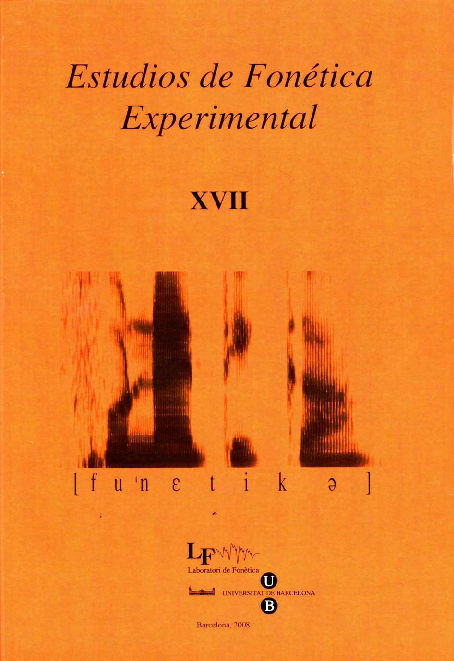New directions in learning, teaching and assessment for phonetics
Keywords:
assesement, e-learning, distance learning, interactivity, VLEAbstract
This paper gives an account of a series of grant-funded initiatives at UCL over the last four years, developing innovations in the teaching, learning and assessment of phonetics within a university context. The first project set out to investigate the value of computers and other IT equipment (such as wireless microphones) applied within small-group advanced practical training, and demonstrated considerable benefits in flexibility, as well as suggesting new perspectives on the interface between phonetics teaching and research. Next, the PHONLINE project is outlined, which we believe to be the first comprehensive attempt to develop an online distance course making available most of the elements of established on-campus phonetic training within a VLE. This project showed how the interactive online mode of presentation encourages the inclusion of research findings even in a foundation-level syllabus and led to further work, now in progress, aiming to develop opportunities for greater interactivity and particularly to explore the use of further audio tools (such as VoIP), both within and in parallel to the VLE, to achieve this. In a final section, we point out that developments in teaching and learning need to be matched by corresponding innovation in assessment, and report a project concerned with providing a background for the development of meaningful and efficient assessments in phonetics, with a survey of assessment types against a conceptual framework from educational theory.
References
ASHBY, M. and A. HIROSE (2008): «Deep and surface learning in phonetics: perspectives from a survey of assessment», paper presented at BAAP, Sheffield, March-April 2008.
ASHBY, M.; J. HOUSE.; M. HUCKVALE; J. MAIDMENT and K. YANAGISAWA (2007a): «A distance e-learning course in phonetics», Proceedings of the XVI International Congress of Phonetic Sciences, Saarbrueken, pp. 1713-1716.
ASHBY, M.; J. HOUSE; M. HUCKVALE; J. MAIDMENT and K. YANAGISAWA (2007b): «Phonetics in a virtual learning environment», Proceedings of the Phonetics Teaching and Learning Conference (PTLC2005), London, UCL.
ASHBY, M. G.; J. A. MAIDMENT and E. R. M. ABBERTON (1996): «Analytic listening: a new approach to ear-training». Speech, Hearing and Language (UCL), 9, pp, 1-10.
BIGGS, J. (2003): Teaching for quality learning at university, Maidenhead, Society for Research into Higher Education and Open University Press, second edition.
BOERSMA, P. and D. WEENIK: «Praat». 12-02-07: http://www.praat.org
BRETT, D: «Unicode Phonemic Typewriter». 12-02-07: http://davidbrett.uniss.it/phonemicTypewriter/ phonemicTypewri ter.html
COLLINS, B. and I. MEES (2008): Practical phonetics and phonology: a resource book for students, London, Routledge, second edition.
CRUTTENDEN, A. (2001): Gimson's Pronunciation of English, London, Arnold, sixth edition.
EVANS, B. and C. MOREIRAS (2008): «Variation and change in RP monophthongal vowels: a comparison of male and female speakers», Poster presented at BAAP, Sheffield, March-April 2008.
FRY, D. B.(1979): The Physics of Speech, Cambridge, Cambridge University Press.
HUCKVALE, M: «SFS Speech Filing System». 12-02-07: http://www.phon.ucl.ac.uk/resource/sfs/
IPA (1999): Handbook of the international phonetic association, Cambridge, Cambridge University Press.
MAIDMENT, J: «juki – ipa phonetic unicode keyboard». 12-02-07: http://www.phon.ucl.ac.uk/home/johnm/juki/jukix.htm visited
MOREIRAS, C. (2006): An acoustic study of vowel change in female adult speakers of RP, unpublished BSc project dissertation, UCL.
NETPhon: 30-05-08: http://www.phon.ucl.ac.uk/home/netphon/Welcome.html.
PHONET: 30-05-08: http://www.jiscmail.ac.uk/lists/phonet.html.
RAMSDEN, P. (1992): Learning to teach in higher education, London, Routledge.
SAMPA. «SAMPA computer readable phonetic alphabet». 12-02-07: http://www.phon.ucl.ac.uk/home/sampa/index.html.
Downloads
Published
How to Cite
Issue
Section
License

This work is licensed under a Creative Commons Attribution-NonCommercial-NoDerivatives 4.0 International License.
All articles published online by Estudios de Fonética Experimental are licensed under Creative Commons Attribution-NonCommercial-NoDerivs 4.0 International (CC BY-NC-ND 4.0 DEED), unless otherwise noted. Estudios de Fonética Experimental is an open access journal. Estudios de Fonética Experimental is hosted by RCUB (Revistes Científiques de la Universitat de Barcelona), powered by Open Journal Systems (OJS) software. The copyright is not transferred to the journal: authors hold the copyright and publishing rights without restrictions. The author is free to use and distribute pre and post-prints versions of his/her article. However, preprint versions are regarded as a work-in-progress version used as internal communication with the authors, and we prefer to share postprint versions.




